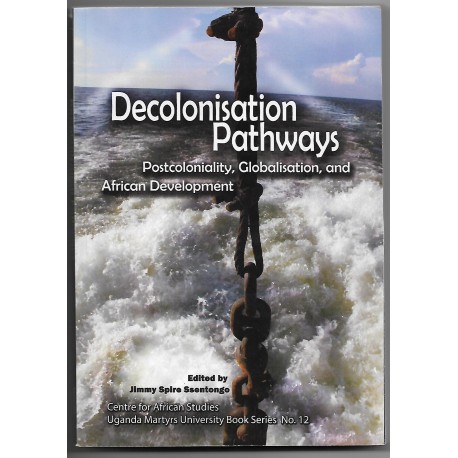Herbert Ekwe-Ekwe
Jimmy Spire
Ssentongo, ed., Decolonisation Pathways:
Postcoloniality, Globalisation, and African Development (Kampala: Centre
for African Studies, Uganda Martyrs University Book Series, No. 12, 2018), pp. 322
IT IS always
a delight to read a study that emphasises its engagement with the unfettered
restoration-of-independence of African peoples. In Decolonisation Pathways, editor Jimmy Spire Ssentongo, along with his
other contributors, is adamant about the goal of this project: to “ … understand
the dynamics behind Africa’s colonial history and postcolonial
performances/identities in the wake of globalisation … Africa can move forward
on a self-decolonisation path and development” (Jimmy Spire Ssentongo, ed., Decolonisation
Pathways, 2018: 14). That evocative insight from South Africa’s Steve Biko,
“The most potent weapon in the hand of the oppressor is the mind of the
oppressed”, posted prominently under the book’s title on the back cover, alerts
the reader of how discerning the writers of the text deem the subject of their
enterprise.
Despite the certainty of the subject and focus as the title cover demonstrates, most of the contributors are caught up in a level of unclarity, right from the outset of their endeavour, that challenges who, indeed, is the subject of their study. Most fundamentally, the study presented is disquieting in its use of “sub-Sahara Africa”, “sub-Sahara region of Africa”, “sub-Saharan African”, “sub-Saharan Africans”, “sub-Saharan African students”, “sub-Saharan migrations”, “sub-Saharan migrants”, “sub-Saharan immigrants”, “sub-Saharan countries”, “sub-Saharans”… – definitely not a book on Africa, Africans, African peoples, as the text’s front cover page title projects distinctly.
Epithet
of racism
IT cannot
be overstated that “sub-Sahara Africa” is gratuitously racist. “Sub-Sahara
Africa” defies the science of the
fundamentals of geography but prioritises hackneyed, stereotypical, racist
labelling. The West’s creators of the “sub-Sahara Africa” epithet have
literally deployed an outlandish nomenclatural code to depict an African
people’s-led “sovereign” state. This is why, for instance, they never
designated South Africa “sub-Sahara Africa” until an African leadership took
power there in 1994. These wealth-studded entrepôts
of the continent of Africa, namely the African-peoples’-led states that the
West and its local allies still control and plunder so ruthlessly, have been
boxed with the label “sub-Sahara Africa” on it in contrast to the Arab-led ones (https://re-thinkingafrica.blogspot.com/2016/06/blog-post_25.html).
“Sub-Sahara Africa” creators ensure that the
use of their epithet has the effect of a purportedly shrinking African
geographical landmass in the popular imagination, particularly within the
consciousness of African peoples (cf. Steve Biko’s injunction quoted above), coupled
with the continent’s supposedly attendant geostrategic global “irrelevance”. The
racism at play in the minds of “sub-Sahara Africa” creators is alarmingly
depraved: there are 1 billion Africans who dwell on a continent whose landmass
is 30,301,596 sq km which is more than the combined landmasses of Western
Europe, the United States, China, India and Argentina that total 29,843,826 sq
km. For Decolonisation Pathways, surely,
“sub-Sahara Africa” constitutes such a key obstacle that the study must dismantle
pointedly, not buy into (!), to guarantee a less stressful passage for its
envisaged African peoples’ march to freedom.
IN his chapter contribution on education in
contemporary Africa, “Whose education is it? The exclusion of African values
from higher education”, Johnnie Muwanga-Zake notes: “[I]n … Africa, education
was imported for enhancing political, social and economic independence and
development through human and physical structural development” (Ssentongo, ed, 2018: 90). Really? Who “imported”
this education? Isn’t this the same EuroConqueror
education programme across the continent that exists, introduced and entrenched
by the European invasion, strategically, to rationalise its Africa conquest and
aftermath which Muwanga-Zake describes as “Eurocentric” (93)? If indeed the reason
of this “imported” education is to “enhanc[e]” the expansive goals in Africa that
Muwanga-Zake himself maps out, then it is not convincing that the author would in
the same breath be advocating some transformative education objective in this
same Africa imbued with what he describes as “African values” (92-108). Undoubtedly,
these two “streams of consciousness” are intrinsically antithetical.
Work is today’s!
Decolonisation Pathways implicitly acknowledges that the European World “abandoned” a toxic waste in Africa in the aftermath of its devastating conquest and occupation of the continent that goes by the name “state”, the “Berlin-state” in Africa,
and Africans, themselves, must get rid of it to survive. It is a dreadful proposition to
conceptualise any progress of African peoples in this “state” – the likes of Nigeria, Niger,
Chad, the Sudan, Guinea M, Guinea N, Guinea Q … or whatever their
ghastly signatures denote. These are contrived contraptions of murder and
murdering of African peoples by Africans
who lead the “Berlin-states” and the pillaging of critical African resources by the same Africans who lead the “Berlin-states”
for transfers to the West and increasingly China.
Every African people, not these notorious leaderships who police
the “Berlin-states” on the West’s behalf, is in the position to
construct an organic state form that is responsive to their own nation’s worldviews
and progress. This is the challenge that Africa faces presently. The quest and its
solution are internal – right there
in the geography of every constituent African people or nation emplaced in
Africa.
AS A RESULT, few
researchers elsewhere in the world have the limitless latitude possessed by contemporary
African students and scholars to embark on this scholarship of restitution and
transformation of a battered history. This enterprise requires scientific rigour
and a critical analysis of concepts and ideas. It also requires focus, tenacity and
resilience. This generation of African peoples’ students and scholars cannot
afford to pass over the burden of endeavour to their children and children’s children’s generations. This will be unpardonable. The work is today’s. Now’s the time.
(John Coltrane & Don Cherry, “Focus on sanity” [personnel: Coltrane, tenor saxophone; Cherry, pocket trumpet; Percy Heath, bass; Ed Blackwell, drums; recorded: Atlantic Studios, New York, US, 28 June/8 July 1960])
******Herbert Ekwe-Ekwe is the author of The longest genocide – since 29 May 1966 (2019) and co-author, with Lakeson Okwuonicha, of Why #DonaldTrump is #great for #Africa (2018)
Twitter @HerbertEkweEkwe


No comments:
Post a Comment